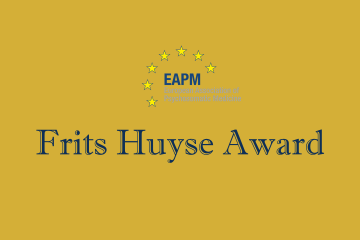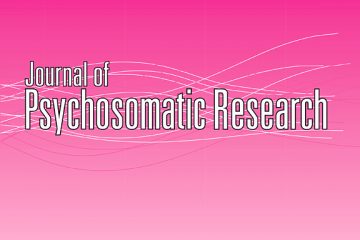The Editor’s choice December 2023
written by Jess G. Fiedorowicz, Editor-in-Chief, Journal of Psychosomatic Research, Professor and Senior Research Chair in Adult Psychiatry, University of Ottawa, Head and Chief of Mental Health, The Ottawa Hospital Scientist, Ottawa Hospital Research Institute, and Antonina Mikocka-Walus, Deputy Editor, Journal of Psychosomatic Research in December 2023.

Jess Fiedorowicz, JPR’s Editor-in-Chief
The Editor’s Choice
“Resilience as an Antidote to Trauma“
This quarter’s Editor’s Choice looks at a psychological protective factor, rather than a risk factor, on cardiometabolic outcomes and all-cause mortality. The study “Psychological resilience to lifetime trauma and risk for cardiometabolic disease and mortality in older adults: a longitudinal cohort study” by Kristen Nishimi (USA), David Bürgin (Switzerland), and Aoife O’Donovan (USA)1 stood out from other works by focusing on a measure of psychological health and rigorously assessing its association with outcomes over eight years of follow-up in >6,500 participants in the U.S. Health and Retirement Study. Kristen Nishimi and her collaborators concisely summarize their findings in the following passage:
Trauma exposure may lead to poor physical health, while psychological resilience – positive psychological functioning in the face of adversity – could offset some of this risk. In 6,596 trauma-exposed individuals, manifested resilience to lifetime trauma was assessed at baseline and cases of cardiometabolic disease (e.g., heart attack, heart failure, stroke, diabetes) and all-cause mortality were assessed over eight years of follow-up. Higher psychological resilience levels were associated with lower risk for cardiometabolic disease (particularly heart failure and diabetes) and lower mortality risk. Promoting recovery and resilience following trauma may benefit physical health into later life.
Psychological resilience is an important concept but can be difficult to define. The authors defined resilience as “one’s level of psychological health relative to level of trauma exposure” and calculated this from the difference between observed psychological health from that expected based on trauma exposure, as estimated from linear regression. Resilience then represented the residual between observed psychological health from that predicted. While this measure nicely captures their defined construct of resilience, it does importantly limit ability for these results to be applied directly to other samples. Cardiometabolic outcomes (heart attack, angina, congestive heart failure, stroke, and diabetes mellitus) were assessed by self-report. Mortality was determined from follow-up reports from household members or via the U.S. National Death Index. For each standard deviation increase in resilience score, the authors found a reduced risk of any cardiometabolic disease (RR 0.92, 95% CI 0.89-0.95) and mortality (RR 0.78, 95% CI 0.66-0.92), while adjusting for time, resilience*time, age, gender, race, ethnicity, education, parental education, history of cardiometabolic disease, marital status, body mass index, smoking, physical activity, and alcohol consumption. Resilience was not significantly associated with cardiometabolic mortality (RR 0.85, 95% CI 0.63-1.15), although the point estimate was consistent with that observed for any cardiometabolic disease.1
With a growing body of research connecting adverse child experiences and various traumas to adverse functional, psychiatric and other medical outcomes, including several studies published in our journal,2-5 adverse child experiences, trauma, and victimization have become a focus of many clinicians and researchers. In the midst of this, the term trauma has been more broadly used. Concern has been raised that so broadly defining trauma may promote vulnerability and undermine resilience.6 This, in fact, is a part of the story behind the current Editor’s Choice. Kristin Nishmi started working with Aoife O’Donovan 10 years ago as a research assistant at the San Francisco Veterans Affairs hospital in work focused on trauma’s impacts on health. Over the course of graduate training and time, Dr. Nishimi has shifted to not only study the negative effects of trauma but also resilience. Their current collaboration embraced an assets-based perspective to better understand the construct of resilience to trauma, and to identify the potential health benefits of resilience.
The work of Nishimi and colleagues indeed encourages us to focus our attention to resilience. It invites several questions. How can we promote recovery and resilience? Does facilitating resilience improve relevant outcomes, including but not limited to cardiometabolic disease or all-cause mortality as studied in this example by Nishimi et al.? Or, are these outcomes observed explained by some third variable, such as neuroticism which may be associated with lower resilience7 and adverse health outcomes.8 We invite your future research in these areas to expand our understanding to answer these and any related questions and to add to our growing list of resilience-focused studies.9-12
REFERENCES:
- Nishimi Kr, Bürgin D, O’Donovan A. Psychological resilience to lifetime trauma and risk for cardiometabolic disease and mortality in older adults: a longitudinal cohort study J Psychosom Res In Press.
- Riedl D, Beck T, Exenberger S, et al. Violence from childhood to adulthood: The influence of child victimization and domestic violence on physical health in later life. J Psychosom Res 2019;116:68-74. (In eng). DOI: 10.1016/j.jpsychores.2018.11.019.
- Siego CV, Sanchez SE, Jimenez ML, et al. Associations between adverse childhood experiences and migraine among teenage mothers in Peru. J Psychosom Res 2021;147:110507. (In eng). DOI: 10.1016/j.jpsychores.2021.110507.
- Eisenberg ME, McMorris BJ, Gower AL, Chatterjee D. Bullying victimization and emotional distress: is there strength in numbers for vulnerable youth? J Psychosom Res 2016;86:13-9. (In eng). DOI: 10.1016/j.jpsychores.2016.04.007.
- Salonen MK, von Bonsdorff MB, Kautiainen H, et al. Work careers in adults separated temporarily from their parents in childhood during World War II. J Psychosom Res 2019;118:63-68. (In eng). DOI: 10.1016/j.jpsychores.2019.01.014.
- Jones PJ, McNally RJ. Does broadening one’s concept of trauma undermine resilience? Psychol Trauma 2022;14(S1):S131-S139. (In eng). DOI: 10.1037/tra0001063.
- Oshio A, Taku K, Hirano M, Saeed G. Resilience and Big Five personality traits: A meta-analysis. Personality and Individual Differences 2018;127:54-60.
- Kelly DP, Weigard A, Beltz AM. How are you doing? The person-specificity of daily links between neuroticism and physical health. J Psychosom Res 2020;137:110194. (In eng). DOI: 10.1016/j.jpsychores.2020.110194.
- Cénat JM, Kouamou LN, Moshirian Farahi SMM, et al. Perceived racial discrimination, psychosomatic symptoms, and resilience among Black individuals in Canada: A moderated mediation model. J Psychosom Res 2022;163:111053. (In eng). DOI: 10.1016/j.jpsychores.2022.111053.
- Sweetman J, van der Feltz-Cornelis CM, Elfeddali I, de Beurs E. Validation of the work stress screener (WOSS-13) and resilience at work scale (ReWoS-24). J Psychosom Res 2022;160:110989. (In eng). DOI: 10.1016/j.jpsychores.2022.110989.
- Lubián López DM, Butrón Hinojo CA, Arjona Bernal JE, et al. Mood disorders and resilience during the first COVID-19 pandemic wave in Spain: Conclusions of the first Spanish survey. J Psychosom Res 2021;140:110327. (In eng). DOI: 10.1016/j.jpsychores.2020.110327.
- Crosta ML, De Simone C, Di Pietro S, et al. Childhood trauma and resilience in psoriatic patients: A preliminary report. J Psychosom Res 2018;106:25-28. (In eng). DOI: 10.1016/j.jpsychores.2018.01.002.




0 Comments